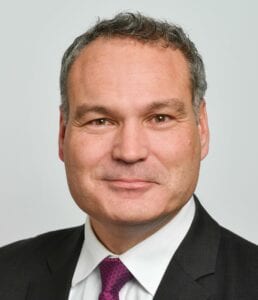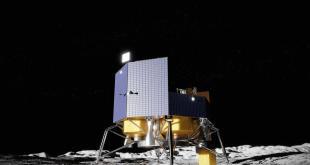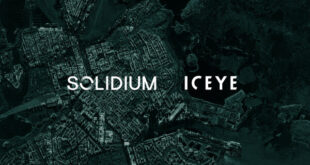
Andreas Schepers spoke with Germany’s top space traveller, the Director General of the German Space Agency and Member of the Executive Board of the German Aerospace Centre (DLR), Dr. Walther Pelzer.
The German Space Agency at DLR, on behalf of the German Federal Government, is responsible for Germany’s co-development and implementation of the space programme at the national, European, and international level. In addition to the national space programme, it includes German contributions to the European Space Agency (ESA), the European Organisation for the Exploitation of Meteorological Satellites (EUMETSAT), and principal client, the Federal Ministry for Economic Affairs and Energy.
German industry is currently promoting a launch platform for micro launchers in the North Sea. What is DLR’s position on this, and what regulatory and legal hurdles must be overcome before such a platform can become a reality?
Dr. Pelzer welcomes the fact that there is an increased conversation about space and points out the importance of space for society. There are currently still maritime and aviation law issues, including the question of the costs of the impact of such a platform on shipping in the heavily trafficked North Sea on the one hand and the use of airspace on the other. Questions regarding international space law and insurance also contribute to the platform’s functional operation. Currently, however, the focus of DLR is on examining the technical aspects of the project.
Asked about developments on the Microlauncher and New Space, Dr. Pelzer is committed to New Space:
“New Space also means that agencies have to change! We shouldn’t dictate which colour has which hue, but rather we should give much more leeway to the creativity and innovative power that lies within the companies. [In the future] we would like to buy in a certain service, bring a payload into orbit – how that is done will be up to the start-ups”.
A European constellation is currently in the discussion that would ensure European sovereignty in connectivity and security.
DLR supports the idea of a connectivity initiative but still sees some open questions regarding competition. SMEs and start-ups are drivers of innovation, but the proposed initiative currently only considers established providers. Dr. Walther Pelzer points out that communication is the most commercialised area of space. The EU Commission should not become a commercial operator of a satellite constellation. He sees the need for modularisation and the protection of private operators already successful in the market.
ESA is about to start a new astronaut selection. Germany is the largest contributor to ESA. Does that mean that a German candidate will automatically be considered?
Dr. Pelzer is counting on German astronauts in the future European astronaut corps and hopes that the two candidates from the German initiative “die Astronautin” will apply. He would be pleased to see an excellent female astronaut from Germany in the new corps.
With regards to Matthias Maurer’s upcoming Cosmic Kiss mission, what are particularly noteworthy German experiments?
Dr. Pelzer expects Expedition 66 to launch in October 2021. Matthias Maurer’s mission will involve working with the Crew Interactive Mobile Companion (CIMON) for further development. Launched in December 2019 for a three-year mission, it is the world’s first flying and autonomously acting assistant for astronauts using artificial intelligence. Matthias will be examining innovative processes for producing concrete.
This Space Cafè Germany, held on 4 March 2021, was hosted by Andreas Schepers, friend of SpaceWatch.Global.
Here the video:
Space Café Germany Rückblick: Dr. Walther Pelzer über Weltraumbahnhof in der Nordsee, Microlauncher, Megakonstellationen und den nächsten Deutschen im All.
Andreas Schepers im Gespräch mit Deutschlands “oberstem Raumfahrer”, Dr. Walther Pelzer, Mitglied des DLR Vorstands und Leiter der Deutschen Raumfahrtagentur im DLR.
Die Deutsche Raumfahrtagentur im DLR übernimmt im Auftrag der Bundesregierung die Konzeption und Durchführung des deutschen Raumfahrtprogramms auf nationaler, europäischer und internationaler Ebene.
Hierzu gehören neben dem nationalen Raumfahrtprogramm die deutschen Beiträge zur Europäischen Weltraumorganisation ESA und zur Europäischen Organisation zur Nutzung meteorologischer Satelliten (EUMETSAT). Hauptauftraggeber ist das Bundesministerium für Wirtschaft und Energie.
Die deutsche Industrie wirbt aktuell für eine Startplattform für Microlauncher in der Nordsee. Was ist die Position des DLR dazu und welche regulatorischen und juristischen Hürden gilt es zu überwinden, bevor eine solche Plattform Wirklichkeit werden kann?
Walther Pelzer begrüßt die Tatsache, dass verstärkt über Raumfahrt kommuniziert wird und weist auf die Bedeutung der Raumfahrt für die Gesellschaft hin. Es stellen sich aktuell noch See- und luftrechtliche Fragen, auch die Frage nach den Kosten des Einflusses einer solchen Plattform auf die Seefahrt in der stark befahrenen Nordsee einerseits und die Nutzung des Luftraums andererseits. Darüber hinaus stellten sich für den tatsächlichen Betrieb der Plattform auch Fragen hinsichtlich des internationalen Weltraumrechts sowie der Versicherung. Aktuell steht jedoch die Prüfung der technischen Aspekte des Vorhabens im Vordergrund.
Nach den Entwicklungen im Bereich Micorlauncher und New Space gefragt, bekennt sich Walther Pelzer zu New Space:
“New Space heisst auch, dass Agenturen sich verändern müssen! Wir sollten nicht vorgeben, welche Farbe welche Schraube hat, sondern wir sollten sehr viel stärker die Kreativität und die Innovationskraft, die in den Unternehmen liegt heben, in dem wir mehr Freiraum lassen.[In Zukunft] möchten wir einen bestimmten Service einkaufen, eine Payload in den Orbit bringen – wie das gemacht wird, ist dann Sache der Startups”
Aktuell wird eine Europäische Konstellation diskutiert, die eine Europäische Souveränität im Bereich Konnektivität und Sicherheit sicherstellen soll.
Das DLR unterstützt die Idee einer Connectivity-Initiative, sieht aber noch einige offene Fragen hinsichtlich des Wettbewerbs. KMU und Startups sind Innovationstreiber, bei der vorgeschlagenen Initiative werden allerdings derzeit nur etablierte Anbieter berücksichtigt. Walther Pelzer weist darauf hin, dass Kommunikation der am weitesten kommerzialisierte Bereich der Raumfahrt ist. Die EU-Kommission sollte nicht zu einem kommerziellen Betreiber einer Satellitenkonstellation werden. Sieht den Bedarf einer Modularisierung, den Schutz bereits erfolgreicher, privater Anbieter auf dem Markt.
Die ESA startet in Kürze eine neue Astronautenauswahl. Deutschland ist der größte Beitragszahler innerhalb der ESA. Heisst das, dass automatisch eine deutsche Person bei der Auswahl berücksichtigt wird?
Walther Pelzer rechnet auch im zukünftigen Astronauten-Korps mit deutschen Raumfahrenden und hofft darauf, dass die zwei Kandidatinnen der Inititative “die Astronautin” sich bewerben. Er würde sich freuen, eine exzellente Astronautin aus Deutschland im neuen Korps zu sehen.
Was sind aus Ihrer Sicht besonders bemerkenswerte deutsche Experimente der kommenden Cosmic-Kiss-Mission von Matthias Maurer?
Walther Pelzer rechnet mit einem Start der Expedition 66 im Oktober 2021.
Matthias Maurer wird in seiner Mission mit einer Weiterentwicklung von CIMON, dem weltweit ersten fliegenden und autonom agierenden Assistenten für Astronauten mit einer Künstlichen Intelligenz, arbeiten – und sich mit innovativen Verfahren zur Herstellung von Beton beschäftigen.





